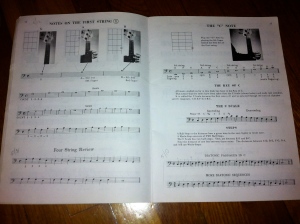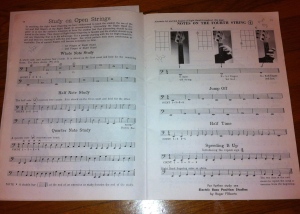Last Set of Craft Project Notes
For my last practice session, I combined both the private practice guided by the book, and a social interaction with another musician friend. As I’m getting ready to close my project, it seems like I’ve made it back full circle. My first blog post on this project was titled “Gathering Materials Socially,” which recounted my experiences trying to acquire a bass guitar. Once I acquired my bass guitar, however, I resorted to my own private study of this musical craft. Unaware of what I was supposed to do, I went online to look for ideas. I considered playing the song “Money” by Pink Floyd based on an instructional youtube video, but was discouraged when the person in the video stated that it was a really difficult and odd time signature, not following the standard 4/4. Therefore, I decided to use the book that I was given to learn the basics.
I’ve already learned to play notes on the fourth, third and second string, attempting to unite some of these as the instructions in the book prompted. The last lesson involves learning notes on the first string and a review of all four strings. It’s been established that my end product would be to be able to play the C scale, in which I would need to unite all of the notes that I’ve learned thus far. Armed with confidence from a very productive session last week, I attempted to go over the first string notes hurriedly. I’m not sure if it’s because of the spacing between the second and the fourth fret, but going from playing A with my second finger to playing B with my third, was a little challenging. Still, I went ‘by the book’ and was able to get in the rhythm of the pattern specified. Because of the similarity of the patterns that I played in the previously learned notes, my ear was attuned to the times that I was supposed to strike each string and the shifts of notes that were caused by it.
The Four String Review, however, was not as easy as I thought. Because the notes weren’t going from the lowest to the highest as I was beginning to get used to, I found myself looking at the previous lessons to determine where each note is played. This means that I still have not memorized the location of each note on the page. Nonetheless I played the pattern I was supposed to play. Not giving myself enough time to practice the C scale (in order to have the “final” product) I still went to my friend’s house to record myself playing. Once I was there, he “let me do my thing,” which entailed me going over all of the lessons I had done in a chunk of twenty minutes.
As I was getting ready to record my scale, he came up to the attic. He asked me to play the scale several times and then noticed that one of the strings was out of tune! He picked up the bass, tuned the string, played the scale that I was playing and then played it backwards. “So that’s what it’s supposed to sound like!” I realized out loud. He then prompted me to do it on my own. And prompted me to do it again. Then he said: “let’s try it with a drumbeat,” and went to his drumset and started playing. I didn’t know what I was doing, so I just resorted to playing the notes that I was most comfortable with. The ones that I had practiced the most. In this short, ten-minute, interaction I learned more than I had in the last couple of weeks!
This interaction allowed me to consider the question of the conception of a solitary learner vs. the socially situated skill acquisition process. In my paper, then, I aim to explore how learning this craft has provided me with insights into the process of learning a craft, specifically one that involves music.

